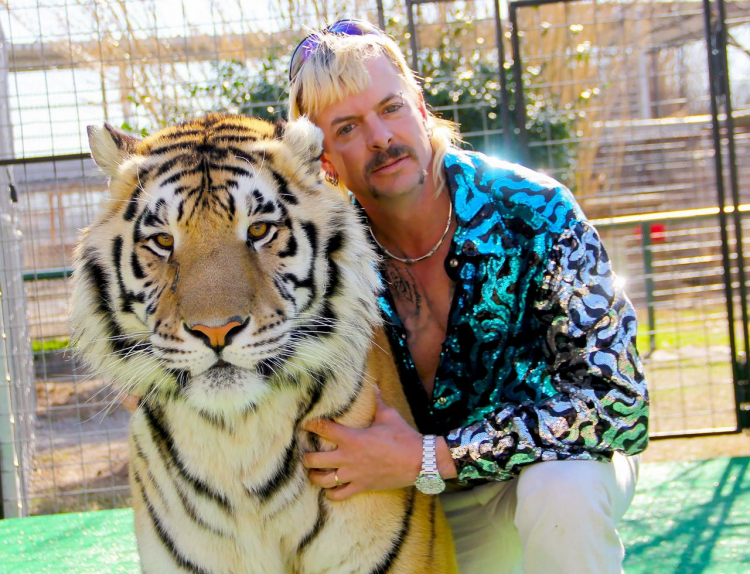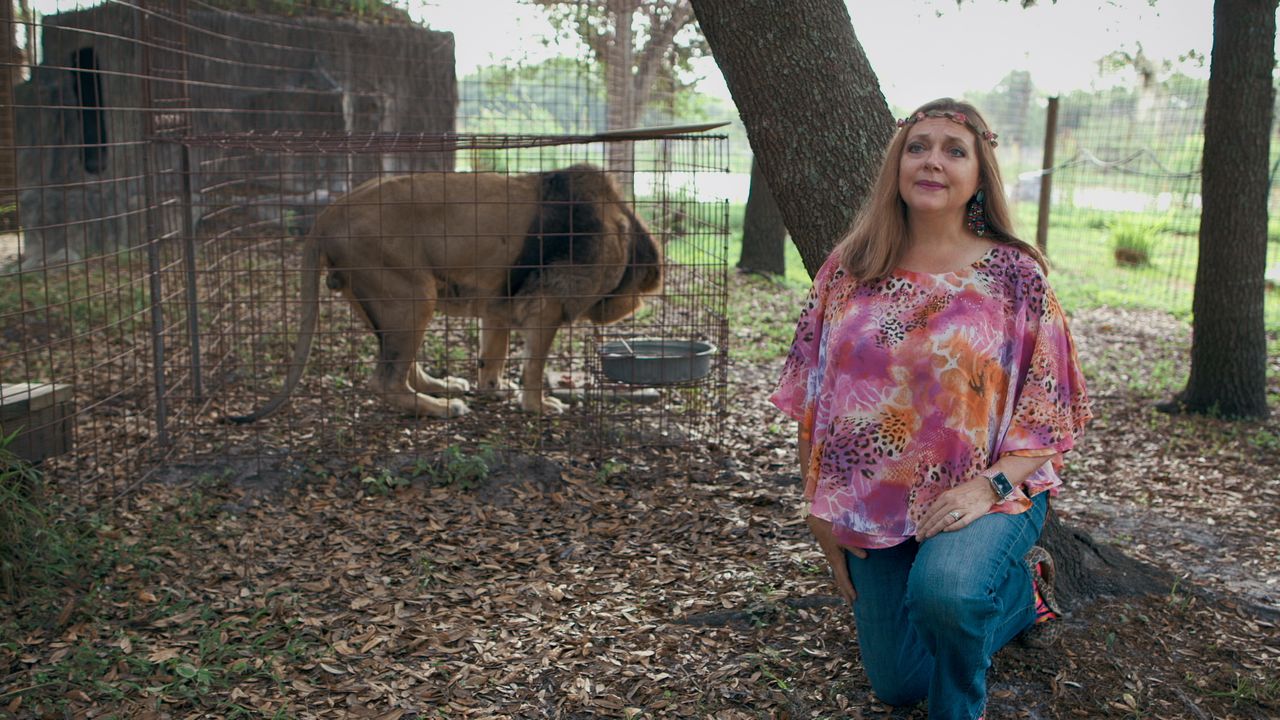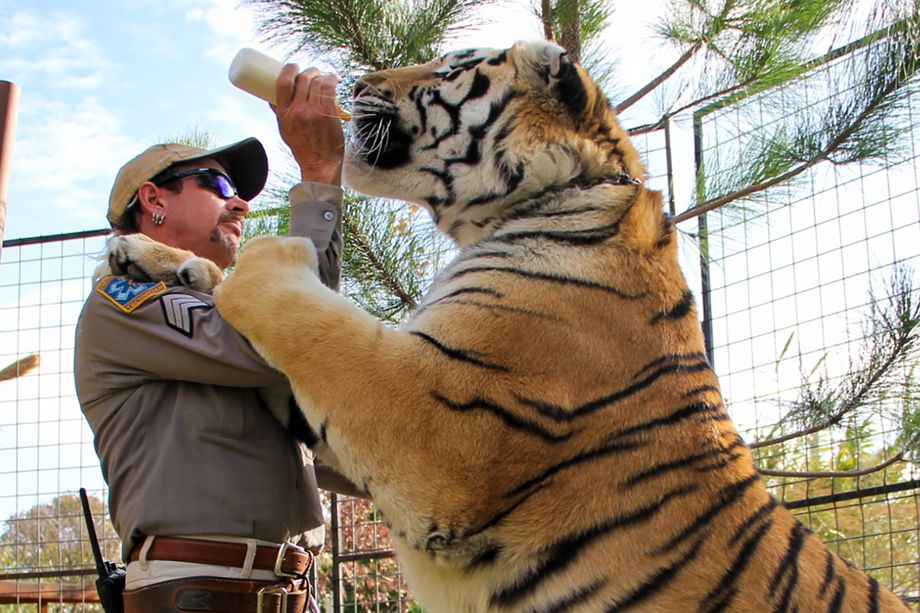The Tiger King Effect

The doors of our beloved movie theaters have closed amidst the coronavirus pandemic, making online streaming an indispensable resource. Platforms such as Netflix, Hulu, Amazon Prime, and many others have gathered a captive audience as social distancing and quarantine becomes the norm.
Netflix, one of the leading streaming services, has premiered its new original series, Tiger King. As the film and entertainment industry have ceased both present and future projects, Tiger King seems like a breath of fresh air for our next binge-watch frenzy. People all over the world have tuned in to this bizarre series, turning it into a viral sensation and the number one most watched on the platform’s top 10 list.
Starring Joe Exotic, self-proclaimed Tiger King and "gay, gun-carrying redneck with a mullet,” he unveils all of his secrets, making us a part of his journey as we take a look at not only the world of big cats but his own collection.
We are introduced to the protagonist as an owner of his own private zoo in Oklahoma, entertainer, and even presidential candidate alongside others in the big-cat industry. A docuseries highlighting the impact on the possession of exotic animals, Tiger King exceeds its limitations becoming a mess of truths, lies, and rumors. The series takes you on a wild ride where you truly have no idea what the outcome of the story will be.
As you first begin watching the series, the fight between animal rights activism and zookeeping is the expected focal point until the realization that Tiger King is not your average show dawns on you, unexpectedly. With even more plot points to offer, true crime is also involved in the development of the series.
After years of following Joe Exotic around until the culmination of his downfall, Joe is arrested and imprisoned for a murder-for-hire plot against his archnemesis. Carole Baskin, an animal rights advocate who runs her own big-cat sanctuary. She constantly tried to close down Joe's zoo which caused Exotic to wage a violent war against her.
From this brief description, it could be deduced that the victim in all of this would be Carole, however, people all over social media seek for Joe Exotic's release from prison.
Why is this so? Has Tiger King presented us with a biased narrative so as to believe that Joe is the true victim here?
Carole Baskin, animal rights activist and owner of Big Cat Rescue / Image Credit: NetflixThe eccentricity and absurdity do not end there; murder, drug use, politics, and an eerie cult-like organization are all what make Tiger King such a unique hit.
The other day I found myself in front of my webcam, waiting for my friend to admit me into the Zoom costume/cocktail party we had planned, dressed as the one and only: Joe Exotic.
As I wore a leopard printed shirt with a mustache made out of construction paper I asked myself: why have I decided to dress as Joe Exotic? Why not Carole or literally any other character, person or thing? The now-notorious Tiger King has become a cult hero.
His eccentricity draws us in and makes us sympathize with him, believing his innocence in the murder for hire plot and almost disliking Carole. Baskin, who actually represents that fight for animal rights in the series has her own conspiracies and secrets, as we find out throughout the series. Believed to have killed her husband and seen as a hypocrite, the show guides us through this perhaps to lure us into Joe's side of the story.
It seems almost impossible to summarize the show and its plot, but that seems to be the whole point. Tiger King has surpassed the boundaries of Netflix and has come alive in various social media platforms in memes, conspiracy theories, and general talk of the series itself.
Not only has the pandemic forced us to look towards Tiger King as an inevitable source of entertainment, which it is, but it has also made it the talk of the town. But what makes Tiger King appealing so as to glue us to the screen? What makes it different from any other binge-worthy show available on the wide variety of streaming platforms?
Me trying to explain #TigerKing to my friends who haven’t watched it pic.twitter.com/Lrn2DyVKSP
— Deana Harley (@Deanaharleynews) March 27, 2020
In just seven episodes, Tiger King is overcome in intoxicating craziness and a carnivalesque reality. Unlike Making A Murderer, another Netflix original docuseries which also gathered a binge-watching following, Tiger King combines aspects of a reality TV show with real-life dilemmas of the fight for animal rights as well as organized crime.
The series raises a lot of questions that are never quite answered and barely touch the surface of the problems it presents. Instead, it wanders aimlessly. Certain aspects of Tiger King inevitably raise eyebrows but if you wish to get to the bottom of them, the series will not do its journalistic job of uncovering the truth, or at least the deeper side of it. In short, there are many “whys” which remain unanswered throughout the show.
Essentially, the goal of discovering what drives these people to own exotic animals is lost in translation. Spending an entire episode devoted to Carole and the rumors that she killed her husband and fed him to her tigers strays away from the fact that animal captivity is a serious issue in America.
It seems to me that the main purpose of the series is to entertain, which it definitely must do without forgetting the search for truth. In a refutation against Tiger King, Baskin has posted that the series "had the sole goal of being as salacious and sensational as possible to draw viewers. As part of that, it has a segment devoted to suggesting, with lies and innuendos from people who are not credible, that I had a role in the disappearance of my husband Don in 1997. The series presents this without any regard for the truth or in most cases even giving me an opportunity before publication to rebut the absurd claims. They did not care about truth. The unsavory lies are better for getting viewers.”
“I’d shoot you before I’d shoot my cat,” said Joe Exotic / Image Credit: NetflixTiger King becomes something to pass your time, to laugh at and make memes afterward to help you simply stay in the loop; the series entertains and points out serious problems. But to what end?
As I watched Tiger King, I realized that the possession of big cats was indeed a problem and – what about it? The series never digs any deeper into the treatment of the animals, into the arduous labor that underpaid workers were forced to accept, into the exploitation of women’s bodies and the bullying, verging on the line of threats, from one faction to another.
Now, do I think Joe is innocent, that Carole is a victim or that the show evades its purpose?
We will never know for sure what the truth is but I believe Joe didn't realize the extent of the whole murder for hire plot, blinded by his own hatred and driven mad by the loss of control. Did Joe want Carole dead? Most likely, but I don't believe he was truly willing to go through with it.
Carole and Joe are, essentially, the same; keeping their animals in captivity and depriving them of the freedom they deserve simply to gain money and fame. The series invites us to reflect on the moral values, or lack thereof, shown in different instances of the show; to analyze the consequences and deeper aspects. Maybe that was the goal all along.
Nevertheless, Tiger King has gathered a following and people can't seem to stop watching or talking about it. And truly, I get it. Tiger King is amusing to watch and helps us distract ourselves from what is currently going on. It helps us bond over something we are all sharing, promotes interesting discussions and pushes us to wonder about this secret world we actually knew nothing about.
And although it does not resolve its plot points as I would like it to, there is no denying the sensation it has become and will continue to be.









